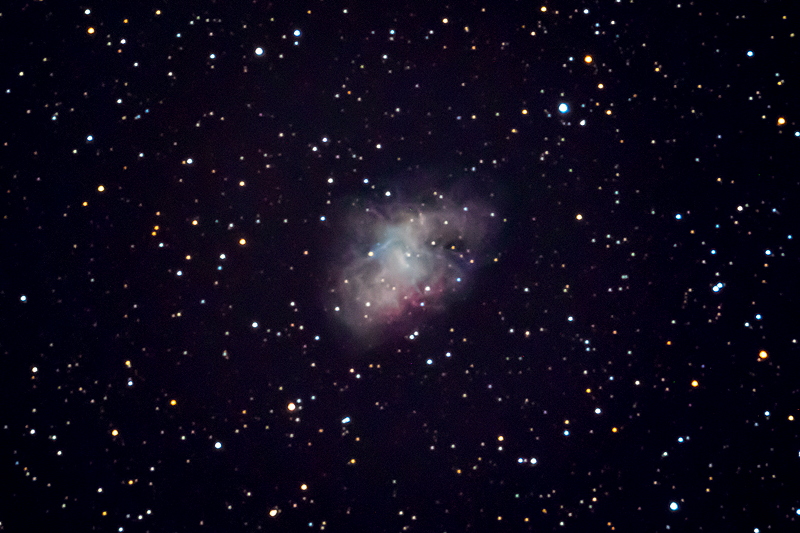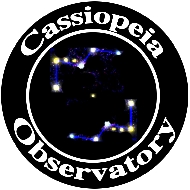Crab Nebula, Galaxies
Posted: 29 March 2019
Clouds returned Saturday morning, 23 March 2019, cleared mid-day, but clouded up again mid-afternoon. Cloudy nights continued until Thursday, 28 March.
On my way to the observatory Thursday before sunset I saw this hawk in a distant tree (cropped from a focal length 300mm photo):

|
Open: Thursday, 28 March 2019, 1814 MST Temperature: 85°F |
Session: 1340 Conditions: Mostly clear |
Equipment Used:
12" f/8 LX600 w/StarLock
2" 24mm UWA eyepiece
Camera:
D850 DSLR
Upon arrival at the observatory I noticed that one of the leg rubber tips on my Starbound Observing Chair had split. I replaced it. I seem to go through a lot of these tips!
1827 MST: LX600 ON, StarLock OFF, High Precision OFF.
SYNCed the AutoStar on the star Aldebaran.
1844 MST: sunset. Saw the "green flash".
Slewed the 12" telescope to M1 (Crab Nebula), which would be my first imaging target of the night. Prepared the D850 DSLR for prime focus imaging. Then began waiting for the sky to get darker.
1900 MST: slewed the telescope to the location of Nova AT2019ckc (RA. 8h 11m 33.5s, DEC -32° 44' 35.2", about Mag. +10.7) in the constellation of Puppis (which was low in the southern sky). No stars were yet visible in the 24mm eyepiece field-of-view due to the twlight sky brightness. 1915-1930 MST: once stars became visible, 102X, I tried to confirm the location of the nova, but was unsuccessful. I suspect I needed a better finder chart of the nova's location.
1932 MST: slewed back to the Crab Nebula. It was faintly visible, 102X.
Mounted the D850 DSLR at prime focus, focused on the star Aldebaran, and locked the primary mirror.
1944 MST: StarLock ON.
This is M1 (Crab Nebula), StarLock autoguided, 5 minutes, ISO 3200, White Balance 4000K, cropped from the original full-frame image:

2007 MST: High Precision ON.
Began imaging some galaxies for my Extragalactic Supernova Project.
These are StarLock autoguided images, 5 minutes, ISO 6400, White Balance 5000K (converted to black-n-white):
NGC2655

NGC2681

NGC2613

2129 MST: StarLock OFF, High Precision OFF.
Done imaging.
2138 MST: LX600 OFF.
|
Close: Thursday, 28 March 2019, 2146 MST Temperature: 59°F |
Session Length: 3h 32m Conditions: Mostly clear |
Many of us know Dr. Clay Sherrod of the Arkansas Sky Observatories and what he has done for amateur astronomers around the world. I highly recommend listening to the TMO Background Mode Interview with Astronomer Dr. Clay Sherrod. You will learn what makes him so special to all of us.
I recently helped set up an automated TESS-W Photometer for night sky quality measurements at Oracle State Park, our local IDA "International Dark Sky Park":

You can see past and current data at the Stars4All web site.
Comments are welcome using Email. Twitter users can use the button below to tweet this report to their followers. Thanks.
Cassiopeia Observatory Home Page
Copyright ©2019 Michael L. Weasner / mweasner@me.com
URL = http://www.weasner.com/co/Reports/2019/03/29/index.html
